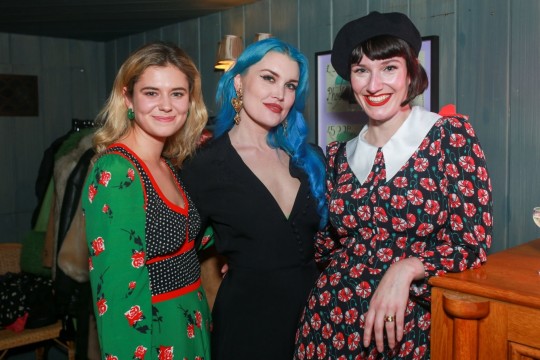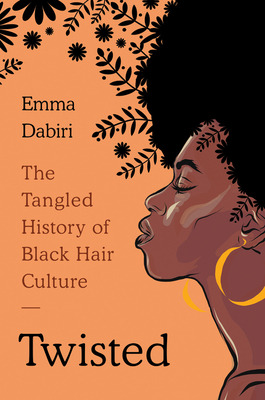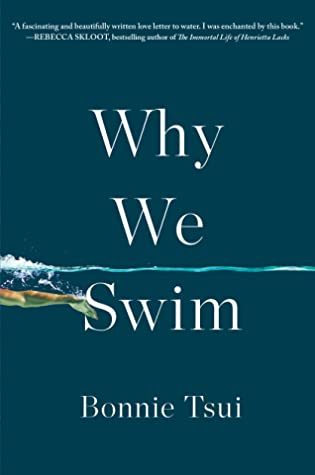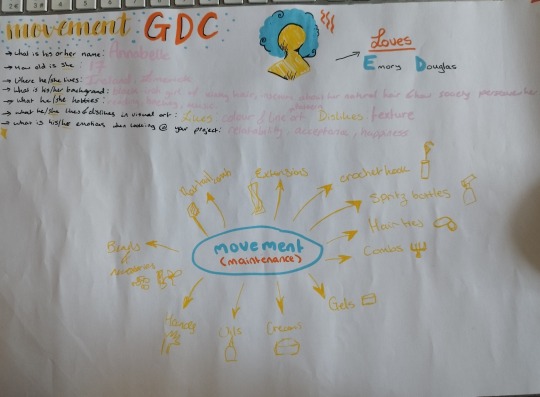#emma dabiri
Text


{20.06.23}
I read Kindred again... I can't get enough of Octavia Butler, she really is one of the greatest writers of all time, in my opinion. I'm working on collecting all of her books!
Don't Touch My Hair has been on my to read list for a while now, as soon as I saw the library had the audiobook I had to get it... even though I really should be working through the masses of books I have at home...
#octavia butler#emma dabiri#kindred#Don't touch my hair#bookish#booklr#bookworm#book#books#currently reading#my reads#books & libraries#bookshelf#book cover
17 notes
·
View notes
Text
1 note
·
View note
Text





Alison Oliver com Coco Fennell, Poppy Chancellor, Emma Dabiri e Emerald Fennell no jantar de comemoração de 10 anos da marca Coco Fennell, 21 de Novembro em Londres.
#alison oliver#cocofennell#poppy chancellor#emma dabiri#emerald fennell#sally rooney#conversations with friends#best interests#saltburn
1 note
·
View note
Note
i’ve been reading a lot of essays recently and i was wondering if you have any that you’ve really enjoyed? i love digging through your book recs and you would love to know your thoughts<3
hiiiii <3 okay so first of all i admit i don't read a lot of essays! but here are some collections that i read and loved:
miami + slouching towards bethlehem + south and west + let me tell you what i mean by joan didion are all really good. joan didion's style is unique and reading her writing never gets boring. love all about these.
intimations by zadie smith is a little tiny collection of essays she wrote during the pandemic and the various quarantines, and i think zadie smith is a brilliant writer and i really enjoyed this.
what white people can do next by emma dabiri because i am a white person who wants to be better and this little book is filled with very well written and interesting essays.
the fire next time by james baldwin technically consists of two "letters" about racism and how americans (and all people) need to react to it and deal with it.
carry by toni jensen is a sort of memoir sort of collection of essays about her life as an indigenous woman in america and about race and police brutality and gun violence.
we are never meeting in real life + wow no thank you + quietly hostile by samantha irby are collections of very funny essays about her life and pop culture and they're light hearted and great.
little weirds by jenniy slate which has whimsical little essays as well as stories, i think she has a really delicate way of telling her point of view (really looking forward to her second book coming out later this year!)
minor feelings by cathy park hong is a very interesting and important collection of essays slash memoir about race and her experience as an asian american.
the collected schizophrenias by esmé weijun wang i first picked up because there's history of schizophrenia in my family and this book absolutely allowed me to see the issue from a very different perspective. it's very interesting and offers a unique point of view on chronic illness and mental health.
calypso + me talk pretty one day by david sedaris were very entertaining to me. sorry i like david sedaris! i really do think he's funny!
these precious days by ann patchett is a gorgeous collection of essays about writing and books and life and death by another one of my favorite authors. i think this one is so great.
genuinely though i would love it if you told me some of your favorites because i think i need to be reading more!!! hope you can find something you like among these and i hope you're having a great day!!!!!! 💖
#book recs#ask#faronnorth#everyone please feel free to answer with your favorite essays and collections!!!!!!!!!!!!!!!
15 notes
·
View notes
Note
Can you talk more about the "doing harm" thing or share some reads you like about it? Everyone seems to have a different definition and I struggle with the difference of what's offensive to an individual vs harmful to a community
My sense of this is something that I have developed over the course of years, based on reading fairly widely about systemic oppression, boundary setting, activist organizing, and interpersonal dynamics. And for me it never stops developing as I continue to reflect more and see how various takes on the topic play out in various communities.
I don't have any specific resources to recommend that spell out how to develop that sense per se, because that all comes down to personal discernment, but I would encourage people to read authors whose analysis of systemic oppression is firmly rooted in anti-capitalism and abolitionism. If someone's perspective on social justice is not rooted in collective liberatory work, then it's just using identity as a means of selling a personal brand a lot of the time.
Writers that i've gotten a lot from include: bell hooks, Angela Davis, Rabbi Ruti Reagan, Aubrey Gordon, Emma Dabiri, Captain Awkward, Koa Beck, and Julia Serano. Some of these writers are more explicitly political than others, but even the ones who are more focused on social norms and boundaries (like Captain Awkward and Ruti Reagan) take a focus that is pretty targeted and practical.
Ultimately, you are gonna disagree with people sometimes about what is harmful. For example, I do not think thought crimes or emotion crimes are a thing. I don't even really think taste or media consumption crimes are a thing. My sister is eagerly playing the new harry potter game right this very moment and I fully do not give a shit. I would rather that she find a way to pirate it so that she wasn't compensating JKR by playing it, enriching JKR is undeniably harmful, but I have zero interest in convincing her not to like a media property, because in her personal conduct she is the only stalwart advocate I have in my family, and I've seen the positive impact that she has on the queer kids at the high school where she works.
my sister's real-life impact on the world matters to me a lot more than her liking this stupid ass game, enough for me to not choose this particular battle. I don't think fighting with her about it would bring any good into the world. In fact, it would drive us apart and make my life, her life, and our mother's life significantly worse. I could understand why people would disagree with me or handle their own affairs differently.
I think broadly speaking most of the social justice oriented internet has wildly lost any reasonable sense of scale or priority as well as tactics on a variety of matters, so we wind up creating tensions within our communities over smaller or symbolic forms of harm even when that makes it more difficult for us to tackle more significant sources of harm in a shared way. my sister cares about trans people, she fights for abortion rights, she's anti cop enough to have persuaded someone close to her not to go to the police academy, and she also is a potter enjoying disney adult. i love her to pieces and im so glad she is alive and i know she's a net positive on this earth. i dont think me haranguing her over her media habits leads to her having a better impact on this earth, and i know it would fuck my life up.
that said, i can't determine what is harmful (or on what scale it is harmful) for anybody else. many people would be very reasonably torn up over their beloved trans friendly sibling still being interested in playing the mega terf antisemitism game. that's all real, and that game and the person who birthed its IP are truly terrible. but i tend to see even the problem of harry potter's success as being a systemic one not an individual choice driven one, so. in this case it's one i let go of.
55 notes
·
View notes
Photo




Diving in Deep: In-Depth Nonfiction Picks
Twisted: The Tangled History of Black Hair Culture by Emma Dabiri
From Guardian contributor BBC race correspondent Emma Dabiri comes an essay collection exploring the ways in which black hair has been appropriated and stigmatized throughout history, with ruminations on body politics, race, pop culture, and Dabiri’s own journey to loving her hair.
Emma Dabiri can tell you the first time she chemically straightened her hair. She can describe the smell, the atmosphere of the salon, and her mix of emotions when she saw her normally kinky tresses fall down her shoulders. For as long as Emma can remember, her hair has been a source of insecurity, shame, and—from strangers and family alike—discrimination. And she is not alone.
Despite increasingly liberal world views, black hair continues to be erased, appropriated, and stigmatized to the point of taboo. Through her personal and historical journey, Dabiri gleans insights into the way racism is coded in society’s perception of black hair—and how it is often used as an avenue for discrimination. Dabiri takes us from pre-colonial Africa, through the Harlem Renaissance, and into today's Natural Hair Movement, exploring everything from women's solidarity and friendship, to the criminalization of dreadlocks, to the dubious provenance of Kim Kardashian's braids.
Through the lens of hair texture, Dabiri leads us on a historical and cultural investigation of the global history of racism—and her own personal journey of self-love and finally, acceptance.
Why We Swim by Bonnie Tsui
An immersive, unforgettable, and eye-opening perspective on swimming—and on human behavior itself.
We swim in freezing Arctic waters and piranha-infested rivers to test our limits. We swim for pleasure, for exercise, for healing. But humans, unlike other animals that are drawn to water, are not natural-born swimmers. We must be taught. Our evolutionary ancestors learned for survival; now, in the twenty-first century, swimming is one of the most popular activities in the world.
Why We Swim is propelled by stories of Olympic champions, a Baghdad swim club that meets in Saddam Hussein’s palace pool, modern-day Japanese samurai swimmers, and even an Icelandic fisherman who improbably survives a wintry six-hour swim after a shipwreck. New York Times contributor Bonnie Tsui, a swimmer herself, dives into the deep, from the San Francisco Bay to the South China Sea, investigating what about water—despite its dangers—seduces us and why we come back to it again and again.
Gathering Moss: A Natural and Cultural History of Mosses by Robin Wall Kimmerer
Living at the limits of our ordinary perception, mosses are a common but largely unnoticed element of the natural world. Gathering Moss is a beautifully written mix of science and personal reflection that invites readers to explore and learn from the elegantly simple lives of mosses. Robin Wall Kimmerer's book is not an identification guide, nor is it a scientific treatise. Rather, it is a series of linked personal essays that will lead general readers and scientists alike to an understanding of how mosses live and how their lives are intertwined with the lives of countless other beings, from salmon and hummingbirds to redwoods and rednecks. Kimmerer clearly and artfully explains the biology of mosses, while at the same time reflecting on what these fascinating organisms have to teach us.
Drawing on her diverse experiences as a scientist, mother, teacher, and writer of Native American heritage, Kimmerer explains the stories of mosses in scientific terms as well as in the framework of indigenous ways of knowing. In her book, the natural history and cultural relationships of mosses become a powerful metaphor for ways of living in the world.
Entangled Life: How Fungi Make Our Worlds, Change Our Minds & Shape Our Futures by Merlin Sheldrake
There is a lifeform so strange and wondrous that it forces us to rethink how life works…
Neither plant nor animal, it is found throughout the earth, the air and our bodies. It can be microscopic, yet also accounts for the largest organisms ever recorded, living for millennia and weighing tens of thousands of tonnes. Its ability to digest rock enabled the first life on land, it can survive unprotected in space, and thrives amidst nuclear radiation.
In this captivating adventure, Merlin Sheldrake explores the spectacular and neglected world of fungi: endlessly surprising organisms that sustain nearly all living systems. They can solve problems without a brain, stretching traditional definitions of ‘intelligence’, and can manipulate animal behaviour with devastating precision. In giving us bread, alcohol and life-saving medicines, fungi have shaped human history, and their psychedelic properties, which have influenced societies since antiquity, have recently been shown to alleviate a number of mental illnesses. The ability of fungi to digest plastic, explosives, pesticides and crude oil is being harnessed in break-through technologies, and the discovery that they connect plants in underground networks, the ‘Wood Wide Web’, is transforming the way we understand ecosystems. Yet they live their lives largely out of sight, and over ninety percent of their species remain undocumented.
#Nonfiction#non-fiction#science#nature#Environment#social change#to read#tbr#highly recommend#Highly Rated#to be read#reading recommendations#Book Recommendations#non fiction books#booklr#book tumblr#library books
204 notes
·
View notes
Text
Movement: Graphic Design and Communication (29/01/2024)
Today I started the Graphics workshop with Lydia and Sharon. We were introduced to the basics of GDC and by Sharon and then Lydia took over and gave us our first activity where we had to create a persona of someone who our movement project would be targeted at.

I made mine about a black Irish girl with hair insecurity. Throughout this project I did want to explore different topics surrounding the natural hair movement such as texturism, length, dreadlocks, maintenance and style. I decides to go with maintenance since it fit the next part of the exercise. We had to make icons out of simple shapes such as triangles, circles and squares. I designed some thumbnails in the sketchbook and then onto a page.




These were the ones I went with. A picking comb, a traditional rat tail comb (my mom calls it a cotton comb but I don't think that's the actual name for it), a crochet hook and a spray bottle.
After the break these were then moved to a digital format using Adobe Illustrator.

Sharon came round and showed me how to merge and how to give my icons shadow. She also recommended the author, Emma Dabiri. Who has written a book about afro textured hair. I will be referencing her through my project now.

I played around with the different tools and in the end my icons looked like these.

I honestly think they turned out very cool and I'm happy with how they look <3.
2 notes
·
View notes
Text
Emma Dabiri new book 'Disobedient Bodies' on body image | The Nine O'Clock Show - RTÉ Radio 1
2 notes
·
View notes
Text
Thanks for tagging me @farminglesbian ^_^
Rules: answer 10 questions and tag 10 people you want to know better
Relationship status: as a matter of fact, today is my 8 year anniversary with my girlfriend <3
Favourite colour: red and green
Three favourite foods: ooof, tough one. I love carbs, so potato, pasta, bread, but I also love vegetables.
Song stuck in my head: basically any song sung by Jessie Buckley part of the recording of Cabaret (2021). But in particular "Don't Tell Mama" and "Maybe This Time"
Last thing I listened to: "Xanadu" by Olivia Newton-John from the official San Junipero playlist
Last thing I googled: book titles recommended by Kristina Tonteri-Young
Time: 11.30 pm
Dream trip: tough one too. Hmm, city trip but also a cottage on the country side? Hiking, beach, discovering ancient sites, museums
Anything I really want: long comfy weekends with my girlfriend
Currently reading: "Women Talking" Miriam Toews and "Don't Touch My Hair" by Emma Dabiri. But also Avatrice smut fan fiction haha
Last song: see above "last thing I listened to"
Last movie: "Triangle of Sadness" at the cinema
Last series: just started "Dead To Me", but I also finished S1 of "Vikings Valhalla" this week
Sweet, savoury, or spicy: all of it
Currently working on: I'm working on my motivation to do some training during the week to build up strength for my weekly archery class
Craving: my comfy bed
Tea or coffee: coffee once a day for breakfast and during winter I drink about 5 cups of tea at the office
Tagging (if you feel like it):
@pensoakspaper @fourorfivemovements @cayoz @spidermimi @bipolarandannoyed
8 notes
·
View notes
Text
tagged by @minigirl87
tag 9 people you want to get to know better
First ship: Naruto/Hinata (back in my Naruto days like uhhh maybe 15 years ago? idk)
Three ships: oh god there are so many uhhh. Steve Rogers/Tony Stark (Marvel), Dr. Julian Bashir/Garak (Star Trek DS9), Ferdinand von Aegir/Hubert von Vestra (Fire Emblem Three Houses)
Last song: Love Me by Brooksie
Last movie: at the cinema I think it was Doctor Strange Multiverse of Madness, at home/streaming it was Black Panther Wakanda Forever (there may be a pattern here)
Currently reading: possibly way too much fanfiction; non-fiction would be What White People Can Do Next by Emma Dabiri; fiction it's Star Trek DS9 The Never-Ending Sacrifice by Una McCormack
Currently watching: supercuts of Dimension 20's Neverafter campaign because I don't have a credit card to pay for Dropout 😅
Currently consuming: Earl Grey tea
Currently craving: fast food that is objectively not that good or tasty but it somehow hits the spot
9 people are a lot (and there were a lot of people already tagged that I would have had my eye on) so my no pressure tags are @spider-starry @writefightandflightclub @oddbunny @ilistentothedark and anyone that sees this and wants to share a little about themselves 💙 again no pressure tho
4 notes
·
View notes
Note
nonfiction book recs pls?
of course !!! here are some of my faves :)))
eggshell skull by bri lee (a memoir by a survivor of sexual assault, and this book takes a very fascinating look at the australian legal system from bri, who actually worked as a legal assistant and oversaw hundreds of assault cases herself. an absolute five star book imo)
how to be a dictator: the cult of personality in the twentieth century by frank dikotter (this one's more for the history nerds, but it's a super interesting book that analyses eight dictators and the circumstances that allowed them to rise to power. a very englightening and accessible read)
the shortest history of china by linda jaivin (once again for the history nerds but this book!!!!! it's pretty short but still packed with so much information, and i really enjoyed taking my time to absorb the contents)
in the dream house by carmen maria machado (one of the most clever books i've read in my entire life. this memoir is written about a woman who was in an abusive relationship with another woman, which is a style of abuse that is rarely talked about, but she still manages to pack in so much stunning prose that at times, you forget everything she's saying is real. machado plays with form and structure in the most brilliant way i've ever seen, and this book truly showcases her talent)
what my mother and i don't talk about: fifteen writers break the silence by michele filgate (if you have mommy issues read this book rn i promise you will cry. filgate literally brought the fifteen most talented writers in the world and asked them to rip my heart open on a page fr)
forensics: what bugs, burns, prints, dna and more tell us about crime by val mcdermid (i'm just gonna copy and paste my review for this from goodreads bc it outlines everything i need to say - this was brilliant !! i know absolutely nothing about forensic science outside of what i've seen on tv but mcdermid has written this book in a simple, concise way that captured the most fascinating parts of criminology and kept me hooked. maybe this is just the law student in me jumping out but it's a truly worthwhile read, as long as you can stomach quite a few graphic descriptions of violent crime)
see what you made me do: power, control and domestic violence by jess hill (an absolutely englightening look at domestic violence and abuse in all of their nuances and the different forms they takes. highly highly recommend that you read this book at least once in your lifetime)
know my name by chanel miller (i felt sick within the first twenty pages. a harrowing memoir from chanel miller, the survivor of the famous contemporary sexual assault case involving brock turner, who ended up getting only 3 months in jail for raping her behind a dumpster while she was unconscious. i can't emphasise enough that this is not, by ANY means, an easy one to get through, so please only read it if you're 100% sure you'll be alright)
what white people can do next: from allyship to coalition by emma dabiri (an absolutely fascinating look at racial allyship that i had never even considered - there were one or two parts that i'm not fully certain i agree with, but all in all it's an interesting piece of political theory, as well as being very short and quite accessible too)
25 notes
·
View notes
Text
Emma Dabiri is an Irish writer, academic and broadcaster - and an expert on race. Born to a Nigerian dad and an Irish mum, Emma experienced extremely different environments growing up: first in a predominantly black area of America and then moving to Southern Ireland where she found herself in the opposite - a very white and racist society.
She remembered how a bookshop in Dublin was her sanctuary and saviour as a child. It turned out it was a radical bookshop - and we agreed that books can provide a quiet rebellion when you're growing up.
Emma has two little boys and currently lives in Margate where she takes advantage of regular sea swimming.
She has written two books 'Don't Touch My Hair' and 'What White People Should Do Next', with her third book just about to be published when we chatted. Emma's writing looks at the concept of race and how the concept of black and white has been constructed in fairly recent history, plus she sometimes shares her own experiences of racism.
We also talked about the Black Lives Matter campaign and assessed how much has changed since the death of George Floyd.
Listen now: http://smarturl.it/spinningplates
2 notes
·
View notes
Text
listening to twisted: the tangled history of black hair culture by emma dabiri (author + narrator). learning a lot. im about a third way thru and its such a fascinating and loving telling of history and culture. im esp interested by chapter 2 that european colonialist capitalist concept of time is completely different from west african time, incl the function and framing of history
i was transcribing some parts that interest me to share but it just kept growing lol. enthralling how she weaves together personal experience, cultural values, colonial history, gender and more. as im relistening to the character to transcibe some bits i keep noticing how shes really braiding all these distinct things together
depending on the size of the braids, a head of hair can take a long time: hours or even days to complete. i'm reluctant to describe this process as time-consuming because i'm keen to disrupt our deeply ingrained yet recent and culturally specific myth of time as a commodity. it makes a lot more sense to imagine braiding as a sociable time during which the business of living is conducted. it is a process that brings people together and facilitates intergenerational bonding and knowledge transmission. women might talk politics or a mother might inform her daughter on sexual mores.
the deeply ingrained truth that black hair is time-consuming does not make sense in an indigenous context. for the yoruba, time was understood in relation to the task that had to be done. until european forms of capitalism, time for most people was your own. the day began at sunrise and ended at twilight. each compund had a sundial to measure the periods inbetween. when the sun was not visible, the amount of work or other keys from nature -- cries of birds for instance -- would provide the farmer with the information he needed. [...] the day was defined by tasks to be accomplished rather than by predetermined units of time. and the yoruba operated by a four-day week. [...] it didn't matter if a hunting month lasted 25 or 35 days long. the event of hunting itself was was privileged above a prescribed unit of time.
as recently as 150 years ago, wage labor seemed both degrading and perverse to the people of what was about to become nigeria. the schedule that most of us grudgingly accept today -- starting work at a certain predetermined time not of your own choice; eating at a predetermined hour dictated by a boss, finishing work at a regimented work ordaiend feom on high -- was seen by great greats as akin to slavery. it was considered anathema who was not a blood relative. compunding these affronts on freedom and autonomy, the british imposed fines for lateness and unauthorized absence. these were deducted from what were already meager or starvation wages.
she immediately follows this dreadful mirror with a section called THE INVENTION OF WOMEN which is a good little shock lol. its enlightening abt woman as a colonialist labor class imposed on yoruban culture where body organs werent immediately relevant to social category before eg lineage
cant find the specific quotes but theres a lot abt hairstyle as an ephemeral art and an assertion like "our hair takes the time it takes" which i found powerful after all the explanations of what time is, culturally
#im remembering a blowup on twitter about this actually#(this = racist history of time)#2023 reading#a tag for my new years resolution to Read Books#audiobooks count !
3 notes
·
View notes
Note
Hello
I really enjoy your blog and have found myself thinking more critically of some aspects of both fandom dynamics, and of those we stan, as a result.
I would consider myself left wing but I feel like I could be much better educated politically, and I wonder if you had any recommendations for resources/books etc?
Thanks!
Thanks so much for sending this anon. It's so lovely to hear what I've written resonated with people.
In terms of resources - I'm going to make a guess and day that if you're a reasonably on line left wing person at this moment in time it's likely that you know far more about the problems of the world than how how people have successfully fought for a better world.
I think one of the problems with current discourse is that what's wrong with the world spreads very quickly, but ideas about how to change things spread slower and if anything bad ideas spread quicker than good ideas. (See anything that starts 'I/or we/or they shouldn't have to.....' which is true enough in its way. But it doesn't matter because of we want anything to change we will have to).
So I'm going to recommend two books and a method to counteract that.
The first is The Transgender Issue by Shon Faye. It is a fantastic discussion of trans liberation and I learned a lot. But just is importantly the first page says that she believes that the liberation of trans people is intimately connected with the liberation of all people. And the rest of the book she explores what that means. It is an amazing example of looking at a particular issue through a radical lens with an aim to build connection and coalition.
The other book I'll recommend is Emma Dabiri's What White People Can Do Next. I haven't read it - but it's on my list - and it's all about how to build coalitions and move beyond having opinions on line as a form of politics.
My method is pick something you care about and find stories of people who have won change in the past (and also lost but start with winning). Stories that value people's lives and voices will help you are both the messiness if trying to change things and the possibility. It'll build a strong reservoir of hope that you will need to draw on.
If you can't find anything come back and I'll see if I have any recommendations on a topic and if you can't think where to start I'll recommend Injustice and Crip Camp).
#also when in doubt#I find rewatching the videos of the Colston statue being thrown in the river#very important
7 notes
·
View notes
Text
Many influencer-activists purport to represent their online communities but it is the individuals themselves who are the primary beneficiaries rather than their followers, who are left with little more substantive than being “represented” or feeling “seen”.
from Jay-Z and Beyoncé crossing a picket line to party shows how shallow celebrity activism really is, by Emma Dabiri
2 notes
·
View notes
Link
More than 150 writers and industry professionals are asking the firm, which is a leading sponsor of UK literary festivals, to drop their investmentsMore than 150 authors and books industry professionals including Naomi Klein, Robert Macfarlane, Emma Dabiri and...
0 notes